Podcast: Play in new window | Download (Duration: 27:52 — 19.2MB) | Embed
Subscribe: Apple Podcasts | Spotify | Amazon Music | Android | Pandora | iHeartRadio | JioSaavn | Podchaser | Gaana | Podcast Index | Email | TuneIn | Deezer | Anghami | RSS | More

Living the Examen Prayer – The Daily Prayer of Discernment: The Examen Prayer with Fr. Timothy Gallagher
Fr. Timothy Gallagher and Kris McGregor discuss the Ignatian practice of the Examen prayer. Fr. Gallagher explains that the Examen is a method of prayer designed to help individuals reflect on their daily spiritual experiences. It involves a brief period of introspection, typically 10-15 minutes, during which one reviews the events of the day to discern where God was present, how one responded to His presence, and how to improve future responses to both consolations and desolations.
The Examen is deeply rooted in Ignatian spirituality and serves as a practical way to apply the teachings on discernment of spirits to everyday life. He illustrates this with examples from the lives of saints such as St. Thérèse of Lisieux, Brother Lawrence, and Blessed Pierre Favre, highlighting how ordinary moments can be transformed into profound spiritual encounters through attentive reflection and openness to God’s grace.
Discerning Hearts Reflection Questions
- Understanding the Examen Prayer: How can the Examen prayer help me recognize God’s presence in my daily life?
- Application of Discernment: In what ways can I apply the teachings on discernment of spirits to my everyday experiences?
- Daily Reflection: How can I incorporate a 10-15 minute period of reflection to review my day and my spiritual responses?
- Recognizing Consolation and Desolation: What moments of consolation or desolation have I experienced today, and how did I respond to them?
- Openness to Grace: How can I be more open to recognizing and responding to God’s grace in the small, ordinary moments of my day?
- Spiritual Growth: How does regularly practicing the Examen prayer contribute to my spiritual growth and awareness?
- Relationship with Jesus: In what ways does the Examen prayer deepen my personal relationship with Jesus?
- Contemplation in Action: How can I become more of a contemplative in action, finding God in the midst of my busy life?
- Learning from Saints: What can I learn from the experiences of saints like St. Thérèse, Brother Lawrence, and Blessed Pierre Favre regarding attentiveness to God’s presence?
- Commitment to Practice: How committed am I to making the Examen prayer a regular part of my spiritual routine, and what steps can I take to ensure consistency?

As outlined from the Spiritual Exercises of St. Ignatius of Loyola
(translated from the autograph by Fr. E. Mullan, S.J. 1909 in the public domain)
METHOD FOR MAKING THE GENERAL EXAMEN
It contains in it five Points.First Point. The first Point is to give thanks to God our Lord for the benefits received.
Second Point. The second, to ask grace to know our sins and cast them out.
Third Point. The third, to ask account of our soul from the hour that we rose up to the present Examen, hour by hour, or period by period: and first as to thoughts, and then as to words, and then as to acts, in the same order as was mentioned in the Particular Examen.
Fourth Point. The fourth, to ask pardon of God our Lord for the faults.
Fifth Point. The fifth, to purpose amendment with His grace.OUR FATHER.
Father Timothy M. Gallagher, O.M.V., was ordained in 1979 as a member of the Oblates of the Virgin Mary, a religious community dedicated to retreats and spiritual formation according to the Spiritual Exercises of St. Ignatius. Fr. Gallagher is featured on the EWTN series “Living the Discerning Life: The Spiritual Teachings of St. Ignatius of Loyola”. For more information on how to obtain copies of Fr. Gallaghers’s various books and audio which are available for purchase, please visit his website: frtimothygallagher.org

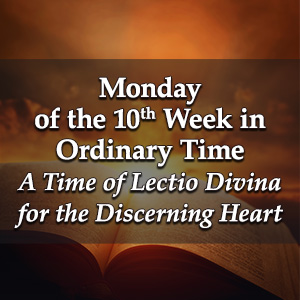 Monday of the Tenth Week in Ordinary Time – A Time of Lectio Divina for the Discerning Heart Podcast
Monday of the Tenth Week in Ordinary Time – A Time of Lectio Divina for the Discerning Heart Podcast

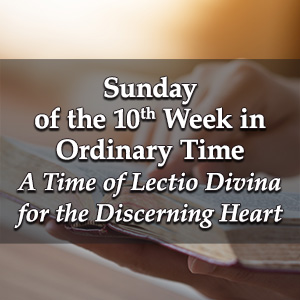 Sunday of the Tenth Week in Ordinary Time – A Time of Lectio Divina for the Discerning Heart Podcast
Sunday of the Tenth Week in Ordinary Time – A Time of Lectio Divina for the Discerning Heart Podcast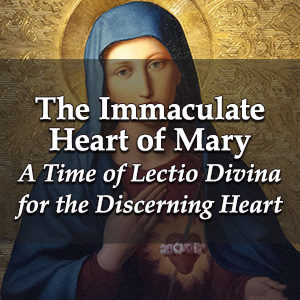 The Immaculate Heart of Mary – A Time of Lectio Divina for the Discerning Heart Podcast
The Immaculate Heart of Mary – A Time of Lectio Divina for the Discerning Heart Podcast
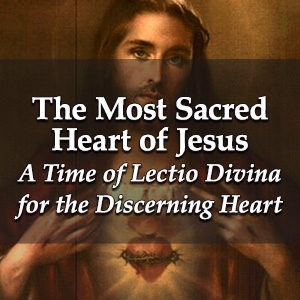 The Most Sacred Heart of Jesus – A Time of Lectio Divina for the Discerning Heart Podcast
The Most Sacred Heart of Jesus – A Time of Lectio Divina for the Discerning Heart Podcast A Sister of St. Thérèse: Servant of God, Léonie Martin – Bearer of Hope with Fr. Timothy Gallagher – Episode 14
A Sister of St. Thérèse: Servant of God, Léonie Martin – Bearer of Hope with Fr. Timothy Gallagher – Episode 14


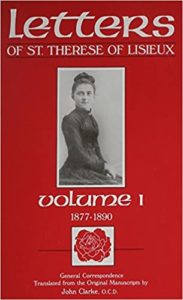

 Thursday of the Ninth Week in Ordinary Time – A Time of Lectio Divina for the Discerning Heart Podcast
Thursday of the Ninth Week in Ordinary Time – A Time of Lectio Divina for the Discerning Heart Podcast

